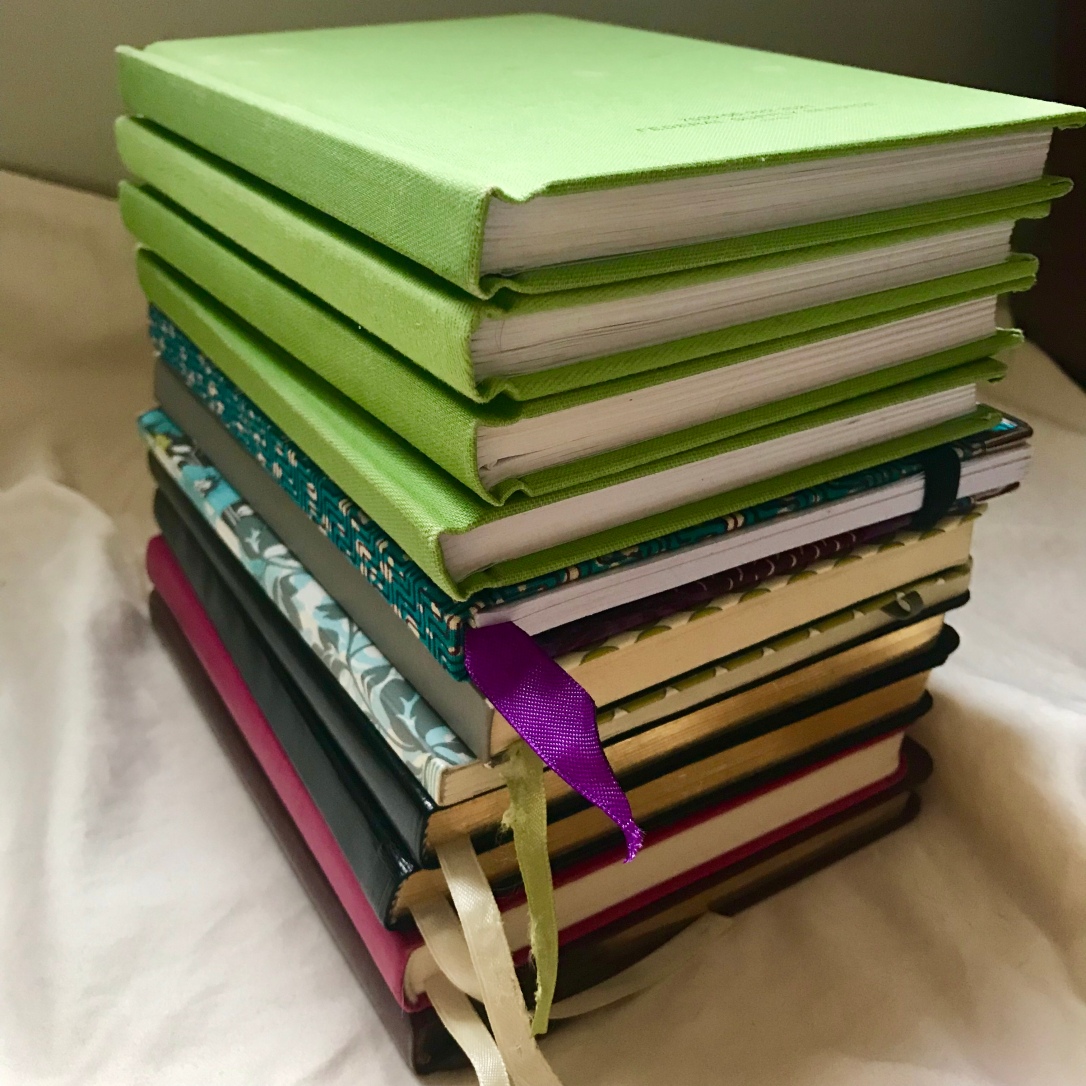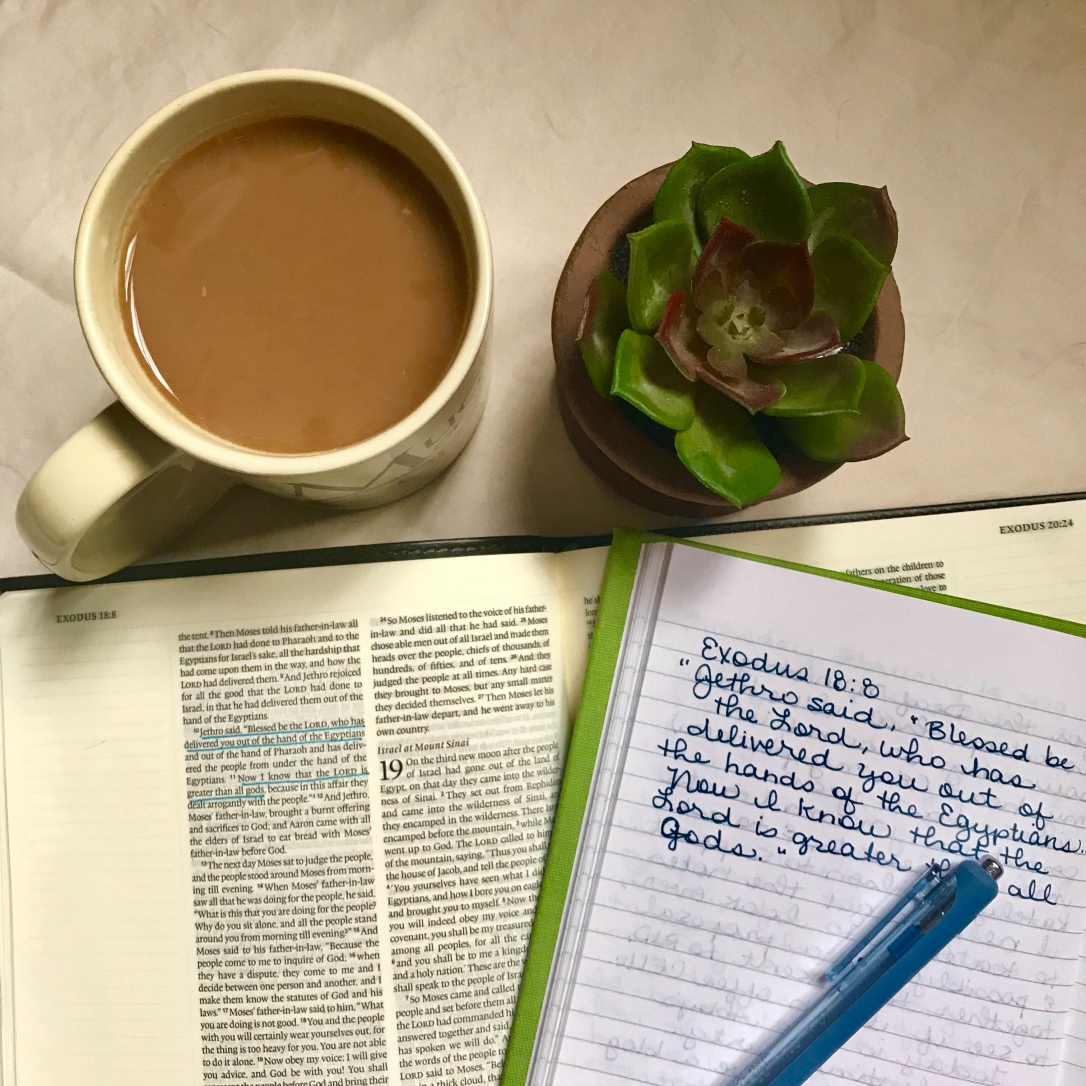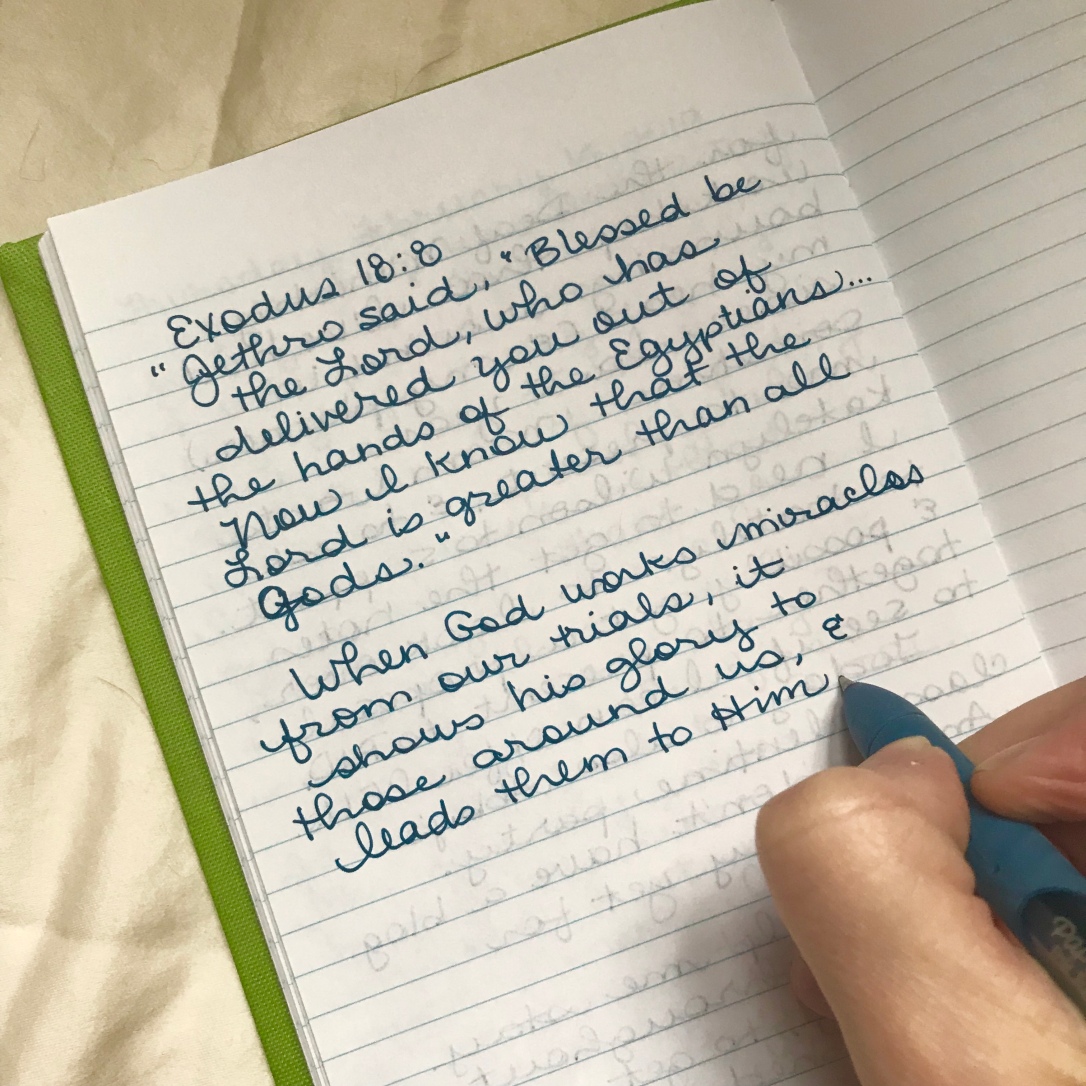Welcome back to the next installment of the Stewardship Series!
If you missed Part 1, Part 2, or Part 3, you can always go back and catch up!
This week I’m shifting gears a bit from the focus on how I’m stewarding my physical health to take a look at one of my favorite spiritual disciplines: journaling.
I love to write. (Is it redundant to say that on a blog?) I have loved writing, and the idea of writing, since I was very young. I can remember being 8 or 9-years-old and taking a notepad and pen out to the “creek” in front of my neighbor’s house to lean against a tree and “write poetry.”
You should know that by “creek” I mean a fairly steep ditch. By “write” I mean that I was an avid reader who somehow picked up on the idea that Real Writers often could be found composing things in the great outdoors (maybe I got this from Anne of Green Gables? Does she write poetry outside? Seems like her…) And by “poetry” I mean that for some reason poems seemed like appropriate things to write whist reclining against a tree (definitely an Anne-with-an-E kind of habit,) even though I had no experience, training, or aptitude for poetry. That my attempts at verse no longer exist for public consumption is thanks to the grace of a kind and loving God.
The other bits of writing penned during this period of my life and later on into my teens (which thankfully also no longer exist,) were my diaries. Those consisted of my daily ramblings about such illuminating topics as which particular habits of my little sister were currently vexing me, what my plans were/had been for the upcoming/past weekend, and (most amusing/embarrassing-to-adult-Jessica) which boy(s) I had crushes on and how he/they did or (let’s face it, more often than not) did not reciprocate.
A few remaining copies of these turned up recently, and while they did give me a giggle or two, as well as start me humming the Garth Brooks classic “Unanswered Prayers,” I felt it prudent they be destroyed. For the sake of posterity.

In college, I had my first taste of journaling as I know it now. In one of the most challenging and life changing classes of my degree, my wise and wonderful professor, Carolyn Jolley, required us to keep a journal. I won’t go into the details of how her course literally altered the course of my life (maybe one day in another post) but the journal I kept for that momentous semester is one of my cherished possessions. When I reread my thoughts and feelings from those days, I see clearly how God was directing my steps, and I remember that I am capable of hard things. So, Carolyn, if you are reading this: thank you!
After college I wrote sporadically, usually when I was stressed or when I needed to process something while I was in a public space where calling my mom wasn’t possible. I know there were several scraps of paper with scribbled prayers I composed on airplanes floating around in my Bible for a while. But I wasn’t consistent until 2011, when I took an online course called Personal Spiritual Disciplines where we read Ordering Your Private World, but Gordon McDonald. The course, and the book, focused on a variety of topics, but journaling was by far my favorite.
Those handwritten airplane prayers always made me feel vaguely sacrilegious for some reason I couldn’t quite pinpoint. But now I felt permission to use the medium I most enjoyed for communicating with God and for facilitating my own spiritual growth.
I’ve been journaling consistently since.

A stack of completed journals currently crowds one drawer of my nightstand, and will soon overflow unless I find a more spacious storage solution. These journals trace the history of my 6.5 year marriage, 1 pregnancy, the birth of my daughter, 3 cross-country moves, at least 3 job changes, my struggle with post-partum anxiety, and a gradual shift in direction for our entire family which might not be clear in my mind if it weren’t for the evidence I read when I peruse the “random” ramblings of the past 3 years.
Journaling has done more to expose my habits, weaknesses, and harmful tendencies than any other practice in my life. It’s hard to argue with your own words, when you see them repeated month after month or year after year. While this might sound terrible or embarrassing, this revealing of faulty patterns in my thinking or pitfalls where I regularly stumble has been a gift and blessing! The first step in overcoming a challenge is to identify the obstacle. My journals regularly pinpoint my problems, with amazing clarity.
Sometimes journaling is how God speaks to me. I always know, if there have been several days in a row when I’ve found excuses not to pick up my journal, that I’m running from something God wants to say to me there. If something is bothering me, but I can’t put my finger on what exactly is wrong, a “brain dump” of all the random thoughts in my head onto the paper often clears the mental chaos and allows me to think clearly. Journaling before I read my Bible or pray is good in seasons when I am overly distracted. And keeping my journal handy during my Bible study and prayer is great for jotting down what I see or hear from God in those times.

Mostly, my journals are a source of encouragement. A quick glance through just the past twelve months of my musings reveals how God slowly planted the seeds of ideas I’m just now beginning to cultivate. I see prayers I prayed (recorded word for word, in my own handwriting) which I can definitively say God has answered. I see how He opened and closed doors, how He placed the right people in our paths at the right times, and how He spoke to us through His Word, or through our pastor, exactly what we needed to hear when we needed to hear it. This tangible reminder of God’s faithfulness and goodness is invaluable to me.
I know some people have concerns about journaling. Maybe you fear what would happen if you put your innermost thoughts on paper, and someone found them and read them. I understand this hesitation. To combat this fear, I’ve implemented some “Standard Practices” for myself.
- For sensitive subjects, I avoid specifics. When I talk about a person or situation, I don’t always give names, or list out all the gory details. This isn’t a letter to a friend, or a novel, or even a blog post, where I might need narrative consistency. If this situation is serious enough, I will remember the details when I come back to read it later. And if I don’t, that’s probably for the best anyway.
- I have an Open-Journal policy with my husband. He is free, at any time, to open my journal and read it. While I don’t think he’s ever taken me up on this policy, knowing it exists helps me remember to use prudence when I’m writing.
- If there is something I’m journaling about, and I’m afraid someone could misunderstand or be hurt by it, I write about those very fears. For example, when I journaled through my post-partum anxiety, I periodically included notes like, “Abby, if you ever read this, please know that Mommy loves you SO MUCH and all these hard things don’t make me love you less.”
Is it possible that someone could still find things to be offended about in my journals? Probably. But ultimately, while I can take every precaution available to me, I can’t control how someone else will react. Because of how powerful this practice has proven in my life, I find the benefits outweigh the risk.

If you’ve never been a journal-er, but I’ve inspired you to pick up your pen, here are some tips to get started:
- Start small. Many people find the practice of writing one or two lines a day to be surprisingly impactful.
- Keep a gratitude list. Every day, jot down 3-5 things for which you are thankful.
- Find a plan with ideas to get you thinking. A quick Pinterest search will yield journaling prompts aplenty.
- Pick out one verse from your daily Bible study. Copy it into your journal and write about why it impacted you. Or try one of these Inscribe the Word plans.
- Journal prayers and praise. Write out what you would normally say to God aloud.
- Write about your goals or plans for the future: what dreams do you have that you aren’t pursuing? What kinds of steps could you take to start moving in that direction?
- Just write about your day. What happened. How you felt. What you wish you’d done differently. The funny thing your kid said. Whatever.
- Don’t worry about messy handwriting, imperfect sentence structure, or grammar and spelling mistakes. This isn’t homework! It’s just a way to engage in self-reflection and open up another channel where God can speak to you.
I’m not sure if journaling is for everyone, but I have a hard time believing it won’t help if you give it a chance. I hope my encouragement gets you writing today!

3 thoughts on “Journaling: An Exercise for My Spiritual Health”